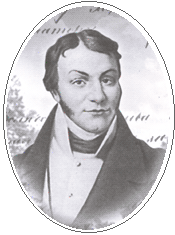Hryhoriy Kwitka-Osnovyanenko
Hryhorij Fedorowytsch Kwitka-Osnowjanenko ( Ukrainian Григорій Федорович Квітка-Основ'яненко * 29. November 1778 in Osnowa , now a suburb of Kharkov ; † 20th August 1843 in Kharkiv) was a Ukrainian writer , journalist and playwright . He is considered to be the founder of Ukrainian novelism.
Life
Hryhorij Kwitka was born in 1778 in the village of Osnova near the city of Kharkiv. He later adopted the stage name "Osnovyanenko" as a kind of homage to his place of birth when he began his literary career. Kwitka fell ill at a young age and remained blind until he was six. At the age of 23 he joined the Kuriazh Monastery near Kharkiv, which he attended for almost four years. Religiousness should keep a central role both in his life and in his work. In 1812 a permanent theater group was established in Kharkiv, in which Kwitka participated as an actor, dramaturge and later as a historian. At the same time, Kwitka took part in many initiatives to promote the educational situation of women.
From 1816 to 1821 he worked as an editor at "Ukrainskij Vestnik", one of the first literary magazines in Ukraine, where he also published short stories and poems. However, Kwitka-Osnoyanenko was not to prove his literary talent until the 1830s when he began to write short stories in Ukrainian.
Create
Kwitka's literary work began relatively late, first in Russian and later in Ukrainian. His Malorossiskie anekdoty (Little Russian Anecdotes) were written from 1820 to 1822 and published in 1822. As a member of the provincial upper class, which saw the existing social and political circumstances as unchangeable, Kwitka never addressed social or political grievances in his works, rather he initially saw writing in the Ukrainian language more as a way of passing the time. His first Ukrainian short story and the first history of modern Ukrainian literature “Saldats'kij patret: Latyns'ka pobrechen'ka po našomu rozkazana” (Portrait of a Soldier: A Latin Tale in Our Language, 1833) is entirely in the tradition of Ivan Kotljarewskyj kept in a comical satirical coloring. To some extent, his other humorous novels, "Parchymove snidannia" (Parchyms Treffen, 1841), "Pidbrechach" (The Second Matchmaker, 1843), and "Kupovanyj rozum" (Purchased Intelligence, 1842) belong to the same genre.
Much more important, however, was his collection of novellas "Malorossiskie povesti" (Little Russian Novellas, 2 volumes, 1834, 1837), which included "Marusia", "Serdešna Oksana" (Unhappy Oksana), "ščyra liubov" (Sincere love), "Bozhi dity" ( Children of God), "Perekotypole", and other stories. In these he moves out of his previous satirical context and showed that the Ukrainian language can also be used for serious topics. These stories had a great influence on the subsequent development of Ukrainian literature and gave Kwitka the title "Father of Ukrainian Prose". With plots devoid of any form of social conflict, and characters that are models of modesty and religiosity, Kwitka's serious narratives are a typical example of Ukrainian sentimentalism based on both written and oral traditions. Its simple spelling is the best example of the widespread belief that writing in Ukrainian means seeing a subject through the eyes of the common people.
Kwitkas also enjoys unbroken popularity for his work as a dramaturge. The comedies “Svatannia na Honcharivci” (dating agency at Honcharivka, 1836), “Šel'menko, volostnoj pysar” (Šel'menko, the local scholar, 1831), and “Šel'menko-denščyk” (Šel'menko , the officer boy, 1837). He also wrote some comedies in Russian, such as "Priezžij iz stolicy, ili sumatocha v uezdnom gorodje" (1840), which some critics consider to be the forerunner of Nikolaj Gogol's auditor. His most famous work in Russian is the novel "Pan Chaliavskji" (Mr. Chaliavskij, 1839).
Most famous works
- Конотопська відьмa (Konotps'ka Vid'ma - The Witch of Konotop) (1833)
- Маруся (Marusja) (1832)
- Салдацкий патрет (Saldackij patret) (1833)
- Сватання на Гончарівці (Svatannja na Hončarivci) (1835)
- Сердешна Оксана (Serdešna Oksana) (1841)
- Козир-дівка (Kozyr-divka) (1838)
- Ганнуся (Hannucja) (1839)
literature
- http://www.hrono.info/biograf/bio_k/kvitka_osnov.php
- http://www.day.kiev.ua/en/article/culture/225th-birth-anniversary-hryhory-kvitka-osnovyanenko
- http://az.lib.ru/k/kwitkaosnowxjanenko_g_f/text_0030.shtml
Web links
- Entry on Kvitka-Osnovianenko, Hryhorii in the Encyclopedia of Ukraine (English)
- http://litplayer.com.ua/authors/kvitka-osnoviyanenko (audio library with the works of Kwitka)
Individual evidence
- ↑ Taras Shevchenko - A Ukrainian Poet's Life; Literary Study, p. 15; Alfred Jensen , Vienna 1916
- ↑ http://encyclopediaofukraine.com/display.asp?AddButton=pages\K\V\Kvitka6OsnovianenkoHryhorii.htm At first he wrote in the tradition of literary travesty represented by Ivan Kotliarevsky, which viewed writing in Ukrainian merely as a pleasant pastime
- ↑ http://encyclopediaofukraine.com/display.asp?AddButton=pages\K\V\Kvitka6OsnovianenkoHryhorii.htm Kvitka's predilection for ethnographic detail left a mark on Ukrainian prose of the 19th and even 20th century. His simple style is attributable to the generally accepted belief that to write in Ukrainian one had to view the subject through the eyes of simple folk
| personal data | |
|---|---|
| SURNAME | Kwitka-Osnovyanenko, Hryhorij |
| ALTERNATIVE NAMES | Kwitka-Osnovyanenko, Hryhorij Fedorovytsch; Квітка-Основ'яненко, Григорій Федорович (Ukrainian); Kwitka-Osnovyanenko, Grigory Fedorowitsch (Russian); Квитка-Основьяненко, Григорий Фёдорович (Russian) |
| BRIEF DESCRIPTION | Ukrainian writer, journalist and playwright |
| DATE OF BIRTH | November 29, 1778 |
| PLACE OF BIRTH | Osnowa |
| DATE OF DEATH | August 20, 1843 |
| Place of death | Kharkiv |
